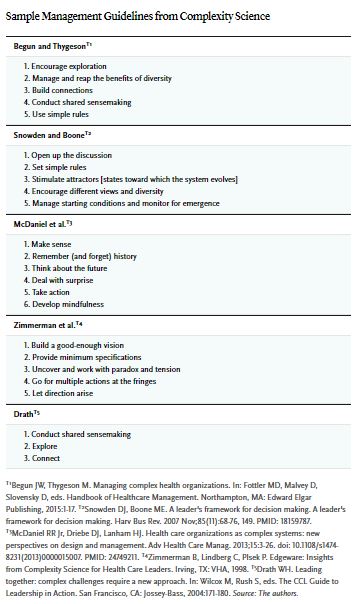“Health care delivery organizations have faced a myriad of important management challenges during the Covid-19 pandemic. Some of the challenges are idiosyncratic to the individual organization; others, however, are broadly faced by almost every health care delivery organization and are likely to be faced in any major disaster.
The first key challenge is the lack of adequate capacity to handle the surging patient volume. [..]
A second challenge is the need for real-time redesign of care models for patients. Given the highly contagious nature and severity of the infection, it is necessary for physicians, nurses, and other clinicians to discover the appropriate care model and room design. A related challenge is protecting the physical and mental health of frontline staff. [..]
Another challenge for hospitals and clinics during this pandemic is the financial loss due to the cancellation of elective procedures and the disruption of routine care [..]
Rightsizing and retraining workers is difficult in normal times and is even more difficult when changes need to be implemented expeditiously.
These four challenges are likely to arise again in any future surprise event. Whether the event is a natural disaster, terrorism, or a pandemic, health care delivery organizations will be challenged to suddenly adjust capacity, redesign care, manage financial loss, and redeploy staff.
[..] Complexity science is the multidisciplinary study of complex systems that are composed of interacting agents and units within a boundary. These systems are complex in the sense that the agents and units within the system are highly interdependent, heterogeneous, and dynamic. Complex systems include organizations such as hospitals, health systems, and medical practices, as these organizations are comprised of highly interdependent, heterogeneous, dynamic, and interacting agents and units.
[..] A complex system’s adaptation to sudden change in the environment is hastened when agents and units in the system are qualified and empowered to react to external events and to supply real-time feedback to decision-makers. Complex adaptive systems exhibit feedback loops between agents and the environment through which information travels and leads to small changes, nurturing learning capacity and continuous adaptation. Complex adaptive systems are similar to an organism, with self-awareness, the desire to survive, and the ability to adapt to environmental changes.
The view of organizations as complex adaptive systems is fundamentally different from the traditional view of organizational systems as machines with the purpose of producing outputs through tightly controlled and standardized processes. Complex adaptive systems, instead, are built for adaptation, flexibility, and learning.
“Simple rules” such as underlying values and cultural norms help to ensure that agents and units react to change in a timely and coordinated manner. Relatively broad guidelines or constraints are imposed on the system from the top down, so that agents and units have substantial autonomy to respond to change. This means that responses will vary from system to system, as local conditions are inevitably different. In effective complex adaptive systems, response is “customized” to local conditions.
Examples of management guidelines consistent with complexity science, from five different sources, are summarized in [the table below]. All of the guidelines begin with the assumption that much of organizational life is unknowable, uncertain, or unpredictable and thus cannot be standardized and controlled. This assumption is due both to the complex nature of the system and the fact that its environment can change radically at any time. The advice to “explore,” “encourage different views and diversity,” “deal with surprise,” “develop mindfulness,” and “let direction arise” reflect this assumption that surprises will happen and that they are largely unpredictable.

[..] sensemaking is a key activity in complex adaptive systems. Sensemaking is the process by which people give meaning to their collective experiences: “the ongoing retrospective development of plausible images that rationalize what people are doing.” Sensemaking is particularly important in times of distress and uncertainty.
The guidelines of “use simple rules,” “set simple rules,” and “provide minimum specifications” demonstrate the futility of trying to micromanage events that are unpredictable and emergent. The notion of simple rules was popularized in health care with the “Ten Simple Rules for the 21st Century Health Care System” promulgated by the Institute of Medicine’s (IoM’s) Crossing the Quality Chasm report in 2001. Paraphrased examples of the IoM’s ten simple rules include “establish the patient is the source of control,” “use evidence-based decision making,” and “consider safety as a system property.”
[..] There are limits to the application of complexity science to management. Management and leadership remain more art than science, and guidelines drawn from complexity science (e.g., innovate, communicate, collaborate) are broad and general. In addition, many organizational processes benefit from standardization, control, and reduced variation. Yet the imperative to “innovate” is critical in response to surprises. Ryu et al. detailed many examples of innovative responses to the current pandemic and emphasized the underlying importance of a “test and learn” culture, including an increased tolerance for creative solutions that are imperfect or untested. The balancing of standardization and innovation are part of the art of management. James March referred to balanced organizations as “ambidextrous,” exhibiting both efficient execution of processes and innovation. Health care organizations need both to thrive.
Complexity science, with its emphasis on simple rules, open discussions, and building connections, provides an orienting framework for response to major surprise. The perspective provides an evidence-based foundation for management during disasters. During the Covid-19 crisis, health care organizations that have emphasized communication, connection, and innovation have effectively addressed the challenges to adjust capacity, redesign care models, redeploy staff, and overcome financial loss.
Complexity science also provides a framework for learning from disasters. Any future disasters will require health care organizations to face challenges that will be different in detail, even while similar in pattern. Health care organizations, particularly those that have entered the recovery and rebuild stage, can use the Covid-19 pandemic as an opportunity to transform into more agile and resilient learning systems.”
Full article, Begun JW and Jiang HJ. New England Journal of Medicine Catalyst: Innovations in Care Delivery, 2020.10.9